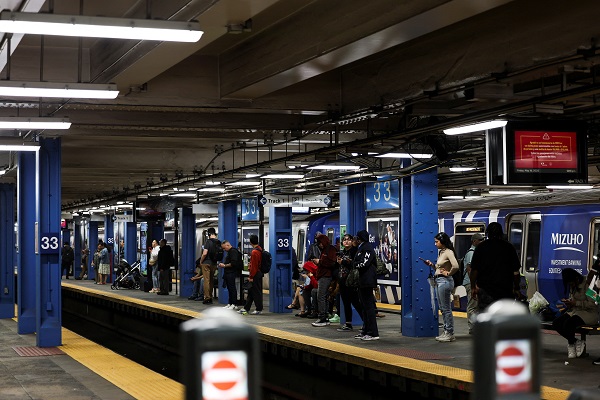 Commuters wait for a train at the 33rd Street Path Transit line after NJ Transit's locomotive engineers went on strike at midnight in New York City, US, 16 May 2025;
Credit: Reuters/Jeenah Moon
Commuters wait for a train at the 33rd Street Path Transit line after NJ Transit's locomotive engineers went on strike at midnight in New York City, US, 16 May 2025;
Credit: Reuters/Jeenah Moon
NEW YORK (Reuters) - New Jersey commuter rail engineers walked off the job on Friday 16 May 2025 after marathon contract talks deadlocked, idling a train system that serves some 350,000 passengers a day, including tens of thousands bound for New York City.
The New Jersey Transit strike, the first in more than 40 years to hit a commuter rail operation that now ranks as the third busiest in North America, went into effect at 00:01 EDT (06:01 CET) as the union deadline for meeting its wage demands lapsed without a deal.
The Brotherhood of Locomotive Engineers and Trainmen, which represents 450 NJ Transit engineers who drive the agency's commuter locomotives, said a fifteen-hour bargaining session broke off when management negotiators walked away from the talks at 22:00 on Thursday 15 May 2025.
The engineers' demands for higher pay were the key sticking point. The union has said it was aiming to raise the engineers' salaries to achieve parity with other commuter railroads in the region.
NJ Transit has said it cannot afford the pay raises the engineers are seeking because fourteen other unions that negotiate separate labour contracts with the agency as part of "pattern bargaining" would then demand higher wage rates as well.
Each side has accused the other of bargaining in bad faith and precipitating the strike.
Although no further talks were formally scheduled, the two parties were expected to resume negotiations by Sunday afternoon, if not sooner, with federal mediators joining in.
As the morning commuter rush got underway on Friday, delays on the bridges, tunnels and ferries crossing the Hudson River into Manhattan were light, according to 511.gov, a website that monitors traffic flows.
Fewer commuters typically travel into New York on Fridays than other days of the week. Many commuters also apparently heeded transit agency advice to work from home on the first day of the strike.
Picket lines and litigation
In a potential widening of the work stoppage, railway workers belonging to other unions refused to cross picket lines that went up on Friday, prompting legal action by NJ Transit.
The rail system filed suits in federal court on Friday challenging what the transit agency called "sympathy strikes" by other unions as a violation of the national Railway Labor Act.
The suits sought court orders requiring unionized dispatchers and overhead power-line operators and Teamsters-represented track inspection and maintenance crews to return to work.
NJ Transit said both groups of workers were vital to keeping its 544-mile rail system safe for 50 private freight operators, as well as commuter rail traffic.
It remained unclear how long the transit strike, the first to hit New Jersey since a three-week walkout in 1983, might last.
Kris Kolluri, president and CEO of NJ Transit, said management was willing to resume negotiations at any time but that meeting the union's wage demands would put the agency into a fiscal "death spiral."
Mark Wallace, national president of the union, said management, not his members, was responsible for triggering the walkout and the union also was ready to return to the bargaining table.
While transit officials have proposed restarting talks at 13:00 on Sunday 18 May 2025, "our goal is to press them to continue to try to move that up," union spokesperson Jamie Horwitz said.
To ease the strike's impact, NJ Transit increased bus services on existing lines and chartered private buses to run from several satellite parking lots, but warned buses would only be able to handle around 20% of rail customers.
At the Port Authority Bus Terminal in midtown Manhattan, several commuters from New Jersey said their buses were not overly crowded.
"I got a seat to myself this morning," said Anthony Wilkerson, 34, a tech worker who lives in West Orange and typically takes the train. But he wondered whether next week would bring more crowding.
The labour clash came weeks after negotiators had agreed on a potential deal in March, only for the union's members to vote overwhelmingly to reject it.
NJ Transit says the engineers currently make $135,000 per year on average and that management had offered a deal that would yield an average salary of $172,000. But the union has disputed those figures, saying the current average salary is actually $113,000.








